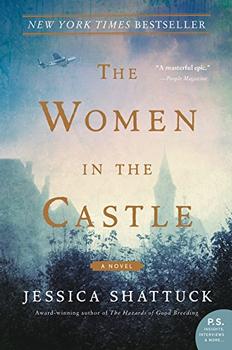Summary | Excerpt | Reading Guide | Discuss | Reviews | Beyond the Book | Readalikes | Genres & Themes | Author Bio

"Oh posh, Connie," Marianne said, trying to tamp down her irritation.
"Marianne," she introduced herself, and extended a hand to the young woman, who, she judged, could not be much over twenty.
"Thank you," the girl said, blinking like a startled deer. "How nice to meet you."
More guests arrived, and Marianne could feel them pressing toward her with hands to shake, welcomes to issue, politics to discuss. There was Greta von Viersdahl, already trying to catch her eye; since Hitler had invaded, Greta spoke of nothing but the winter clothes she was collecting for the Sudeten Germans, so recently "returned to the fatherland," so long "oppressed by the Slavs" . . . Marianne wanted no part of Greta's politics. Impulsively, she took Benita's arm. "Give us a chance to become friends," she said over her shoulder to Connie, already leading Benita through the back door and into the lantern- bedecked courtyard.
"How beautiful!" Benita exclaimed.
"Isn't it?" Marianne said. "Like a fairy tale. Countess von Lingenfels has a talent for the amazing."
Benita nodded, staring wide eyed.
"So tell me about yourself before we are swarmed with admirers," Marianne said. "Was your trip all right? Have you found your room?" She hurried through the necessary questions, half listening to the girl's replies.
From all around, she could feel people's eyes. "Remind me how you met Connie." Marianne plucked two champagne flutes from a table and handed one to Benita, who accepted it without thanks.
"We just met in the town square, really," the girl said. "I was there with my troop—my BDM troop—"
"Good grief! The BDM? How old are you?" Marianne exclaimed.
"Oh no—not the one for little girls—for the older girls, Belief and Beauty. I'm nineteen."
"Ah." Marianne patted her arm. "Positively ancient."
The girl glanced at her.
"Aren't these lovely?" Marianne pointed at the white chrysanthemums and dark autumn anemones arranged in pots along the balustrade. High above, pale clouds scudded across the dark sky. And in the distance, the woods were inky in the twilight. "So the town square . . ."
Benita sipped her champagne and coughed. "It's not much of a story. We met and talked and then later we went out for dinner."
Marianne rested her glass atop the courtyard wall. "And now you are to be married."
"When you say it like that"—
Benita hesitated—"it sounds odd."
Marianne smiled and cocked her head to the side, knitting her brows. She had learned this scrutinizing expression from the countess and found it proved helpful at drawing out confessions and explanations from children and family members, even grown men.
But it did not have the desired effect on the girl. Instead, she seemed to find her mettle, squaring her shoulders. "There were a few things in between."
"Of course," Marianne said. Why had she taken this interrogative tack? The girl was to become Connie's wife. It would do Marianne no good to have started off this way. "I'm sorry—I don't mean to pry.
"Come." She glanced around the rapidly filling courtyard for an opening and, with relief, spotted Herman Kempel, one of the rubes who had been so smitten with Benita earlier. "Let's go talk to your latest admirer."
As the night wore on, a kind of giddy, reckless energy took over. A comical figure in lederhosen and kneesocks played an accordion— was he someone the countess had hired or a local guest?—and people began folk dancing on the uneven cobblestones. Women even kicked off their shoes, despite the cold. And inside, the American jazz trio the countess had invited finally arrived. They played ragtime in the great hall while a number of the bolder, more cosmopolitan guests demonstrated dances with silly names like the Big Apple and the Lindy Hop. Somehow, despite the improvised stove and lack of running water, the chef presented a steady stream of delicacies: traditional pork meatballs with a delicate parsley sauce, plump white steamed dumplings, and silver- dollar sausage rounds. But also novelties—asparagus wrapped with paper-thin ham, jelly molds, pineapple flambé, and caviar toast . . . like the music, the food spanned the gamut of German cultural life.
Excerpted from The Women in the Castle by Jessica Shattuck. Copyright © 2017 by Jessica Shattuck. Excerpted by permission of William Morrow. All rights reserved. No part of this excerpt may be reproduced or reprinted without permission in writing from the publisher.




If there is anything more dangerous to the life of the mind than having no independent commitment to ideas...
Click Here to find out who said this, as well as discovering other famous literary quotes!
Your guide toexceptional books
BookBrowse seeks out and recommends the best in contemporary fiction and nonfiction—books that not only engage and entertain but also deepen our understanding of ourselves and the world around us.